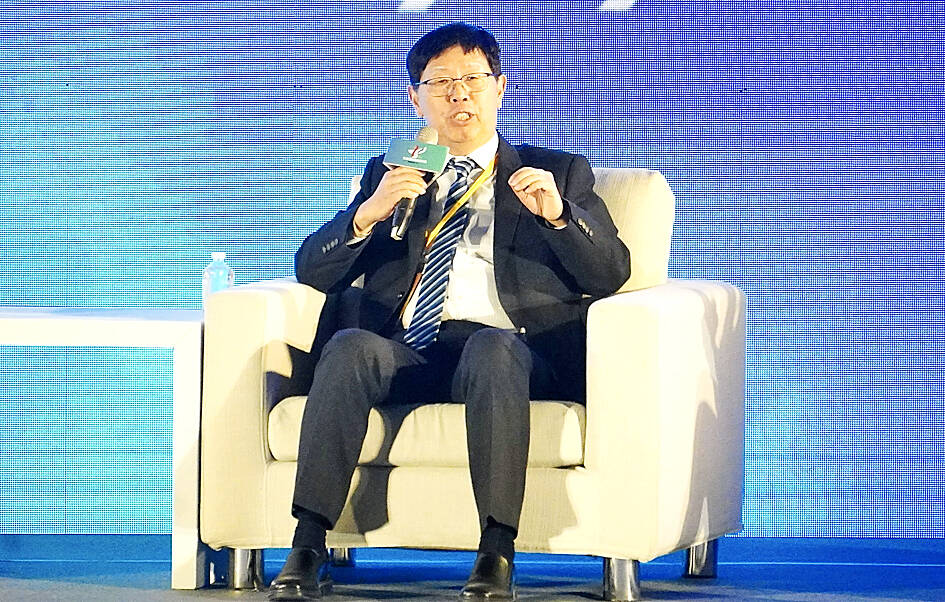Hon Hai Precision Industry Co (鴻海精密) is partnering with US artificial intelligence (AI) chip designer Nvidia Corp to develop humanoid robots, chairman Young Liu (劉揚偉) said on the sidelines of the Kaohsiung Smart City meeting on Friday.
The company is adopting Nvidia’s software technologies and hardware platforms to develop human-like robots and has set its sights on Kaohsiung to launch humanoid robot services, Liu said.
Hon Hai has already introduced non-humanoid robots as part of its production lines, using Nvidia’s technologies.

Photo: CNA
Local media cited Liu as saying the company is planning to introduce humanoid robots to other services, including the healthcare industry.
Nvidia CEO Jensen Huang (黃仁勳) has said that robots would become the next wave of AI development, predicting that upcoming innovations would be dominated by humanoid robots and self-driving cars.
While Hon Hai is working with Kaohsiung in smart city development, Liu said the company is also planning to cooperate with Taipei and Keelung governments in this field.
Hon Hai would integrate resources to allow software developers to gain access to its efforts in smart city development to establish an environment of sovereign AI, which refers to a nation’s capabilities to produce AI using its own infrastructure, data, workforce and business networks, Liu said.
Hon Hai, also known as Foxconn Technology Group (富士康科技集團), is expected to see consolidated sales top NT$7 trillion (US$212.7 billion) this year on the back of strong global demand for AI applications, Liu said.
Hon Hai yesterday reported record consolidated sales of NT$6.86 trillion for last year, up 11.37 percent from a year earlier, and more than the NT$6.16 trillion in revenue posted for 2023 as a whole.
It came as the company reported better-than-expected sales growth in the final quarter of last year as the AI infrastructure buildout continued apace.
The company's sales over the past three months were NT$2.13 trillion, up 15.17 percent year-on-year, exceeding analyst expectations for a 13 percent rise.
Last month's sales rose 42.31 percent to NT$654.83 billion, also beating analysts' estimates, which the company attributed to a small shipment of GB200 servers powered by Nvidia's advanced Blackwell graphics processing units.
Hon Hai said in a statement that it expects mass production of AI servers to begin later this month and projects significant sales growth for the first quarter of this year.
Due to robust global demand, AI servers are forecast to make up 50 percent of Hon Hai’s server sales this year, and shipments of AI servers are likely to grow from quarter to quarter to become the most important driver of the company’s sales growth, it said.
Additional reporting by Bloomberg

TRAGEDY STRIKES TAIPEI: The suspect died after falling off a building after he threw smoke grenades into Taipei Main Station and went on a killing spree in Zhongshan A 27-year-old suspect allegedly threw smoke grenades in Taipei Main Station and then proceeded to Zhongshan MRT Station in a random killing spree that resulted in the death of the suspect and two other civilians, and seven injured, including one in critical condition, as of press time last night. The suspect, identified as a man surnamed Chang Wen (張文), allegedly began the attack at Taipei Main Station, the Taipei Fire Department said, adding that it received a report at 5:24pm that smoke grenades had been thrown in the station. One man in his 50s was rushed to hospital after a cardiac arrest

PUBLIC SAFETY: The premier said that security would be tightened in transport hubs, while President Lai commended the public for their bravery The government is to deploy more police, including rapid response units, in crowded public areas to ensure a swift response to any threats, President William Lai (賴清德) said yesterday after a knife attack killed three people and injured 11 in Taipei the previous day. Lai made the remarks following a briefing by the National Police Agency on the progress of the investigation, saying that the attack underscored the importance of cooperation in public security between the central and local governments. The attack unfolded in the early evening on Friday around Taipei Main Station’s M7 exit and later near the Taipei MRT’s Zhongshan

SAFETY FIRST: Double the number of police were deployed at the Taipei Marathon, while other cities released plans to bolster public event safety Authorities across Taiwan have stepped up security measures ahead of Christmas and New Year events, following a knife and smoke bomb attack in Taipei on Friday that left four people dead and 11 injured. In a bid to prevent potential copycat incidents, police deployments have been expanded for large gatherings, transport hubs, and other crowded public spaces, according to official statements from police and city authorities. Taipei Mayor Chiang Wan-an (蔣萬安) said the city has “comprehensively raised security readiness” in crowded areas, increased police deployments with armed officers, and intensified patrols during weekends and nighttime hours. For large-scale events, security checkpoints and explosives

ON ALERT: Taiwan’s partners would issue warnings if China attempted to use Interpol to target Taiwanese, and the global body has mechanisms to prevent it, an official said China has stationed two to four people specializing in Taiwan affairs at its embassies in several democratic countries to monitor and harass Taiwanese, actions that the host nations would not tolerate, National Security Bureau (NSB) Director-General Tsai Ming-yen (蔡明彥) said yesterday. Tsai made the comments at a meeting of the legislature’s Foreign Affairs and National Defense Committee, which asked him and Minister of National Defense Wellington Koo (顧立雄) to report on potential conflicts in the Taiwan Strait and military preparedness. Democratic Progressive Party (DPP) Legislator Michelle Lin (林楚茵) expressed concern that Beijing has posted personnel from China’s Taiwan Affairs Office to its